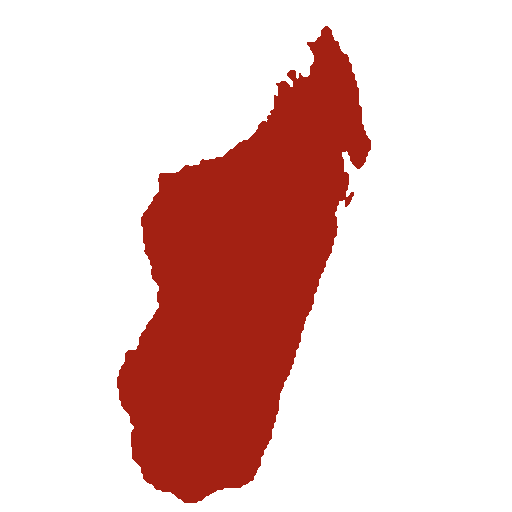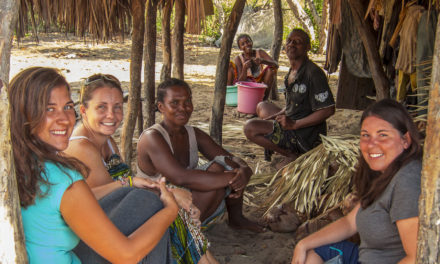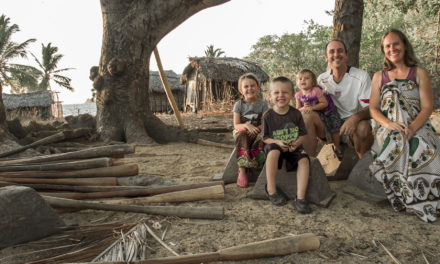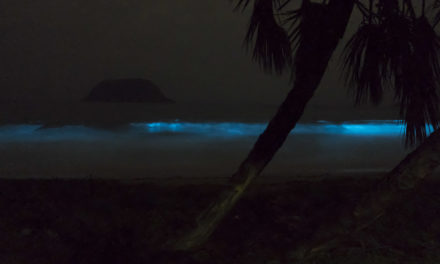I t was three days before the day we’ve long waited for: the day we’d leave town, take a long ride in a van, go about one hour upriver by canoe, then three hours over hills and through rice fields by foot, and finally arrive in the village of Ambodihazina, where we’d begin a new work – making relationships, learning village life in Madagascar, and see the beginnings of an indigenous Christian church start to form. Three days before finally beginning the sort of work that God called us to so long ago, the life and work we’ve been preparing and training for, anticipating for so long. Three days before that, a week ago Saturday, we woke up to the sound of hacking and vomiting, rushed footsteps, and groaning.
Someone asked Lora, “how are you feeling?” We felt great. But about 12 of our friends and co-workers were doing horribly, starting in the middle of the night. Bad dehydration was already setting in for many of them. Then a few of them started collapsing as they tried to get out of bed or walk to the bathroom. In less than an hour, about half of our co-workers were loaded up and on their way to the hospital, many too weak to even stand. The doctors in our team started passing out medicine. About five or six of us (including me and Lora) still felt great and spent the first half of the day treating those who were still sick but not so sick that they needed the hospital.
But it didn’t last. Halfway through the day, the rest of us started feeling funny and weak, and diarrhea and vomiting started getting the rest of us. Many of those sick who were still at the base started getting worse. Matimu started to get a fever then started to diarrhea. Medicine didn’t help and his fever got worse. He stopped accepting food and drink. Lora and I needed rest, but as we tried to sleep we got the chills and I became a little delirious. Matimu got worse and also vomited. There were still two of our co-workers who never got sick, so they came to take us to a clinic in the middle of the night. After about one grueling hour of trying to find Matimu’s vein so they could start him on an I/V solution, we gave up and went back to the base.

Matimu at the public hospital in Tamatave, shortly after checking in. A bare bed and the I/V is tied to the bed post with another I/V tube.
M atimu continued to get worse and still refused to drink much, so his dehydration was getting critical. Sunday morning we went to the public hospital where they have a pediatrician. The hospital was filthy, dirt everywhere, stains, and plastic bottles full of disposed needles sitting on the desk in the admission room. They were also unable to find his veins in his arms and legs and said they had to put the I/V in his jugular vein. Lora and I were exhausted, sick ourselves, and totally scared. Our boy needed help desperately but we’d never heard of an I/V in the neck before. Could we trust them? We didn’t have a choice, and thankfully they succeeded.
The doctors and nurses rarely checked on us, the hospital was dirty, rarely cleaned, our room had used needles on the floor when we arrived, and there was only one toilet for all the patients that was absolutely filthy, and no running water in our building. They didn’t give any food, no sheets or blankets, and even the medicine and all medical equipment had to be purchased by the patient at the pharmacy and brought back to the hospital before they would administer any of it. They even had a few dirty diapers mixed into the sand in the dirty children’s play area right next to the pediatrics building. But regardless of all that, Matimu rehydrated and improved quickly. Thankfully, one of the doctors on our team (the one who didn’t eat the same food and so didn’t get sick) checked on us regularly and was very reassuring and helpful. Matimu regained a lot of energy and started to smile again. His diarrhea worsened and he vomited a couple more times, but overall he improved. By then, Lora and I were also over our sicknesses. Tuesday, my birthday, and the day all of us were supposed to move out to various villages and begin working there, we were released from the hospital.
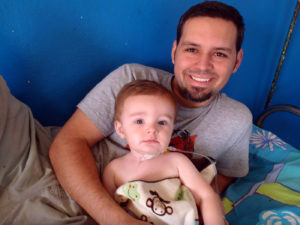
Me and Matimu on my birthday (July 3rd), in the morning before they removed the I/V and released us from the hospital. Matimu was doing much better after being rehydrated.
I t was a great sort of “homecoming” when we returned to the base – everyone was so happy to see us, and it was a warm welcome back. But it was sort of sad too, to see so many people so weak and thin from fighting the illness. Many, including Matimu, were still dealing with diarrhea. Overall, the food poisoning got about 30 or 35 people, everyone who’d had a piece of birthday cake from the Friday before. Apparently the cake was stored in the refrigerator or freezer and someone else had put some raw meat too near it, and the bug spread.
But everyone was in good spirits, still resting, but happy to still be alive and over the worst of it. We obviously needed to reschedule our time to head to the villages, but no one was giving up. For about a day out of the hospital, Matimu was doing great, drinking well and starting to eat again, and no more vomiting, no more fever. But he wouldn’t accept his anti-diarrheal medicine and apparently it made him angry enough to stop drinking or eating Wednesday afternoon. By Thursday morning, Matimu was pretty dehydrated again and we were nearing our wit’s end. It was even possible that he had a lingering infection from the food poisoning. One thing after another! And we weren’t even supposed to be in town any more, but out in a village beginning a new work to introduce the Kingdom of God!
We took the advice of some of our team’s medical staff and came to the capital city where we could receive much better quality healthcare and determine once and for all the cause of the illness. We booked all the seats on a taxi-brousse so that we could leave right away and we spent the next 8-9 hours on the slow, windy roads between Tamatave and Tana, the capital city. We arrived late in the evening at a hospital that surprisingly appeared to be just like an American hospital in terms of quality and cleanliness. They said Matimu was certainly dehydrated, but not at all critical, so they gave him another I/V serum (easily inserted into his arm this time) and they began lab analyses to determine if there was still anything infecting his body. By the next morning, they determined there was no longer any illness in his body, and he just needed time and observation to rehydrate and stop his diarrhea. Thank God!
N ow it’s Sunday, we’re out of the hospital, Matimu’s diarrhea is almost completely stopped, he’s drinking and eating great, and we just have one more check-up tomorrow morning before determining if he’s totally recovered. But we’ve learned that back in Tamatave, the rest of our co-workers will be heading out to the villages without us on Tuesday. Not only will we not be there in time to join them, but at this time no one is going to Ambodihazina, the village we were scheduled to go to, because too many in our group were hit too hard with the sickness and are still not recovered enough.
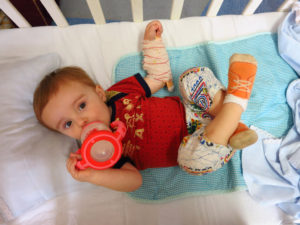
Matimu at the hospital in Tana – much better care, much better equipment, much better in every way. Thankfully he’s over his food poisoning, all rehydrated, and better now!
After all our struggles, and what successes we’ve had in their midst, this feels like a failure. We were almost there, and now we’re not going at all. We’ll return to Tamatave, have to wait a few weeks before our co-workers return and then resume a few more weeks of training again. Now we won’t be moving out to a village (and now it won’t be the one we’ve been praying for) until the end of August. It feels like a major setback. For those of you who might not know, it was just over 13 years ago that God called me to Madagascar, back before I knew this island even existed. All of those years of waiting and training, preparing and expecting, we were on the verge of beginning the work God called us to, and now there’s been another delay – one that in itself was tremendously stressful and terrifying, where we didn’t know whether or not our son’s life hung in the balance.
L ife is like that. I think that even more, the Christian life is like that. When God made his truth known to us, and called us to join his Kingdom, he didn’t call us to a life saturated with pleasure and pleasantness, he simply called us to follow him, no matter where the road takes us. The major difference is that God is the one guiding our steps, Jesus is the one who opened the path and walked it before us, and the Holy Spirit makes it possible for us to follow. But it’s not paved over and smooth, it’s not a quick escalator ride to Heaven, and it never will be. If you tell me there’s a Christian who hasn’t experienced anything bad and unpleasant, and even downright horrifying, since he began his Christian life, then I’ll tell you he likely hasn’t been a Christian for very long.
I’ve experienced far more difficulties and seemingly insurmountable challenges since God made himself known to me and called me to follow him, then I ever did before then, and most of all in regards to the unique call that God gave me to follow him here to Madagascar. Heck, I was just a teenager, I knew nothing about missions and probably even less about the world as a whole, and I’d barely been a Christian for just one year! The challenges of becoming trained to do this, of figuring out what “this” is, of financing my training and my future life, were actually the easiest parts. Even harder was convincing some family and friends, MUCH harder still convincing my (then) girlfriend’s family, that this was not only possible, but right. And the path towards missions that we’ve taken, the area in which we feel called to serve God, and the way we believe he wants us to do it, have been challenged all along the way. Even here in Madagascar, even among fellow missionaries, there’s always strong pressure to do it a different way, one that’s faster or has more quick results, or simply more comfortable.
But regardless of all that, regardless of challenges and obstacles and pressures to change, we’re simply called to follow God where he leads us. Discovering that path isn’t always so easy and the only sure way is to keep our eyes firmly on Jesus, always bringing our lives to him, offering our lives, and asking Jesus to take us where he’s going, to show us where his Kingdom is spreading. One thing is for sure: if we follow the path of Jesus, it leads us inevitably to the cross. “A servant isn’t greater than his master” (John 15:20). We won’t be able to avoid the struggles of life, the challenges that naturally arise, and least of all the challenges to the call that God has uniquely given each of us. The sad thing is that many of those obstacles are so challenging, that when many Christians arrive at “the cross” in their lives, they’re tempted to give up and quit. The way becomes too hard. Even Jesus cried out in anguish and pain before finally and fully submitting to God’s total will in his life, to death on the cross.
One thing we can’t forget when faced with the cross in our lives: it’s not the end. On the other side of the cross is resurrection and new life! It’s a new life that can only be had by going to and through the cross of Jesus. One of the most wonderful things about this dynamic, that we see clearly in Jesus, is that when a person goes to and through the cross, and they arrive at the resurrection, it’s not only for themselves that the new life comes, not just for us as individuals, but for all around us! For Jesus, the Son of God, the cross meant resurrection and new life for the whole world! For us, it means new life to all those people and everything around us, all who and all that the Holy Spirit touches through us. Our call to follow Jesus, even to the cross, wasn’t just for the benefit of ourselves, but for all those around us. It means new life in our relationships, our communities, in our social systems, our environments, in our governments, and eventually extending to the entire world. Jesus’s death and resurrection is to bring new life and make all things new – that his Kingdom will touch every place on earth!
S o let us follow Jesus as he’s called us to: following him through the challenge of his call, the suffering of the cross, and beyond to the new life that only he can bring. Let us not lose heart and grow weary when we’re faced with the cross. Not only do we know the one who’s already suffered it before us, but we know that it’s through the cross that new life comes! “Brothers and sisters, as I said, I know I have not arrived, but there’s one thing I’m doing: I’m leaving my old life behind, putting everything on the line for this mission. I am sprinting toward the only goal that counts: to cross the line, to win the prize, and to hear God’s call to resurrection life found exclusively in Jesus, the Liberator.” (Philippians 3:13-14, The Voice translation)
So we have in our lives another challenge to our call, another setback to its fulfillment, even danger to our lives. But that’s the Christian life. It’s no more true for us than it is for you. But together we’re pressing on, we’re following the call that God has given us, and we will gain that prize: new life!
In Christ,
Adam, Lora, and Matimu Willard
P.S. Thank you SO much to all of you who prayed for us during this time! I had a few chances to get on the internet and post on Facebook, and so many of you responded with prayer and encouragement. I have no doubt that your prayers were answered and helped Matimu make his recovery and helped us keep our thoughts straight as we sorted through all the voices and made the best medical decisions for Matimu that we could make. Your prayers and encouragement have really meant so much to us!

A view of Tana, the capital city, from our hotel where we’re staying for a few days, waiting to be sure Matimu is completely recovered. It’s a beautiful city when you can see the buildings up and down the hills, especially in the morning and evening.
